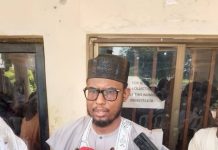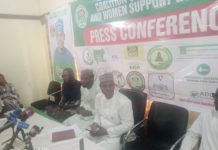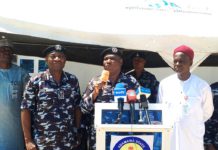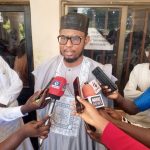Adamawa’s huge debt elicits furore amidst rising allocations
•Stakeholders express melancholy say state’s future mortgaged
By Mohammed Ismail
In the last six years of governor Ahmadu Umaru Fintiri’s administration, Adamawa State debt burden has almost doubled from about N140bn to about N272bn, despite rising Federation Account Allocation (FAAC) and IGR inflows into the the state.
Data by the debt management office (DMO) portal disclosed that the state is indebted to the tune of over N122bn local debts and $97m foreign debt.
Related news
We’ve paid off N63bn debts bequeathed to us by Ganduje – Kano Gov’t
Nigeria’s galloping external debt to hit $45bn in 2024
Fintiri appoints Prof Danjuma as DG of Debt Management Agency
But while the state continues to enjoy high revenues from FAAC allocations, grants and IGR, residents continue to suffer deprivations making more than 50 percent of the populace to be ensnared by multi-dimensional poverty amidst the negative effects of climate change with adverse consequences such as worsening flood incidences which engulfed the state in recent times leading to deaths, displacements and destruction.
On assumption of office, the Fintiri led government did not mince words in excoriating past administrations for bequeathing humongous debt burden without visible and commensurate developmental milestones.
The government accused past governors of frivolously frittering away the huge debts which made the state to lack the critical infrastructure and investments needed to jump start economic rejuvenation. But despite the odds, governor Ahmadu Umaru Fintiri pledged to work round the clock to turn around the economy of the state.
Decrying the huge debt profile of N140bn inherited by Fintiri during a press conference on 27 April 2021, Dr. Ishaya Dabari, the state commissioner of finance noted that the debt profile has visibly stalled the growth of the state.
He accused previous administrations of misusing the debt leaving the state in a huge economic crisis.
He pointed out that rather than create wealth with the multiple loans collected, past administrations diverted the loans to other uses to the detriment of the citizens.
Dabari, said the heavy debt forced the government to borrow N15 billion to finance capital projects that have a direct economic bearing on the lives of Adamawa people.
He explained that the loan was used for the construction of two fly-overs and interchange in the state capital, as well as different projects in all 21 local councils of the state.
The commissioner noted that while no government could operate effectively without borrowing, the previous government was reckless with the loans collected since it was not used for the public good.
“Since we came on board, we only collected loan once; N15 billion from a commercial bank, which is being used to construct all the roads in the 21 local councils, including the fly-over and interchange”.
“Of course, we inherited over N140 billion from previous governments. Some have matured and we paid them fully. There are some that are still ongoing, warranting the deductions of a reasonable amount from our federal allocations monthly for the settlement of such loans, both local and foreign,” he stated.
However, he lamented that the state was yet to access the N2 billion Coronavirus Disease (COVID-19) loan, which would have greatly assisted it in mitigating the impact of the pandemic in the state.
Blaming the situation on the huge debt stock left behind by the previous administration, he said the Central Bank of Nigeria (CBN) and Asset Management Corporation of Nigeria (AMCON) downgraded the credit rating of the state to negative did not help matters.
But six years down the line, the debt burden has only multiplied despite the fact that the state has received more federal incentives in the aftermath of the fuel subsidy removal in 2023 in addition to enjoying a better IGR portfolio as data has shown.
A domestic debt report for Adamawa State which is the latest report by the Debt Management Office (DMO) published on September 30, 2024 said Adamawa domestic debt stands at N122,631,854,429,76. The DMO stated that the data was derived from domestic data report and signed-off submissions received from the 36 states and FCT.
Another report by the DMO on the status of the external debt as at December 31, 2024 states that the multilateral debt stock of the state stands at $93,920,098.50 while bilateral debt (China, Exim Bank, JIKA, INDIA, KFN, IsDB and AFD) stand at $4,000,000. In summary, the total foreign debt stock stands at $97,920,098.50.
Going by the official exchange rate of N1,500 to $, the foreign debt stock stands at N149bn. Conclusively, the total debt stock of the state both local and foreign stand at N272bn.
All efforts by this paper to get feedback on the actual debt profile of the state from the Debt Management Agency (DMA) did not come to fruition. When contacted the DMA boss Prof Ibrahim Danjuma told the reporter that there may be discrepancies between what the DMO published with the actual debt profile and asked the reporter to tarry while they reconcile the data.
But three months after, the agency failed to give its own side of the story prompting the reporter to go ahead with the story.
The debt portfolio troubling, alarming – Analyst
But reacting to the situation, a development expert, and public affairs analyst, Calvin Anadio Lawan expressed concerns over such huge debt profile adding that it will surely lead to economic perdition especially for the future generations.
”The growing debt profile of $97m in foreign loans and N122 billion in domestic debt as reported by the DMO is worrying, especially when we consider that our government has received large financial handouts from the FG over the past six years, including bailout funds and post-subsidy support.
”If our government has had access to all this money, why do we still owe so much?
The bigger concern is what this means for our future.
”Debt isn’t necessarily bad if it funds long-term projects that boost growth and improve people’s lives – like rural access roads, hospitals, schools, or jobs in agriculture.
”But if borrowed money is spent on flashy but unproductive projects or used to pay salaries, it becomes a burden. What this rising debt means is that future administrations will have less money to spend on basic needs, and ordinary people will feel the pinch.
”This is the time to ask hard questions about where the money is going, because the cost of silence will be paid by the next generation,” he said.
Activist slams lawmakers for becoming executive appendage
But speaking on the debt burden, Adamawa frontline activist, Yusuf Sunday Amos carpets Adamawa lawmakers for willingly becoming an appendage of the executive arm.
He said Nigerian lawmakers both at the federal and state levels are virtually doing the bidding of the executive eroding their roles of checks and balances
”As far as the legislature is concerned, whether at the state level or the federal level, virtually we don’t have checks and balances. That’s just the truth of the matter. We are not saying that when you are in the legislature, you are there to fight the governor. No, that’s not what we are saying. We are not advocating that the legislature should always fight the governor or the president. But where is the checks and balances for which we have this separation of powers?
”What we have seen so far is that whatever the executive wants, the legislature will give. So we have a kind of symbiotic relationship that only them know what they are benefiting from this relationship. As far as I’m concerned, we don’t have separation of powers. There are no checks and balances. If it is 1,000 times that the governor wants to borrow money, the legislature will approve. If it is 20,000 times that the president wants to borrow, the legislature will approve. Anything that the executive wants, the legislature will approve. Why? Because he who pays the piper dictates the tune,” he said.
Govt borrowings not aligned to our needs – Residents
Residents of Jimeta, metropolis which received government priority in project allocation decry government borrowing as it does not align with their needs.
The residents who described the flyovers constructed by the state government as cosmetic projects said the billions spent in constructing the bridges serve no useful purpose to them.
”These cosmetic projects meant nothing to us as we are inundated by flood ravages whenever it rains,” a resident, Sani Ibrahim told our reporter.
Yola has in recent times witnessed successive floods which left in their trail sorrows, mourning and shattered lives.
Affected residents said government carefree attitude towards undeserved communities is responsible for the artificial disaster.
”Our areas are without proper drainage systems or accessible roads. This flood is not new; it happens every year. But instead of investing in proper drainage and roads to channel water away, the government is building flyovers that we don’t need. What good is a flyover when our homes are under water?” asked Muhammad Musa, a resident of Jambutu.
Another resident, Mrs. Maryam Bala of Doubeli, lamented the loss of her foodstuff and household items. She argued that poor planning by the authorities worsened the impact of the natural disaster.
“We are suffering because the government does not care about ordinary people. If there were good drainage systems, this rain would not have destroyed our lives. Everything I stored for the season is gone,” she said tearfully.
Many community leaders echoed these sentiments, noting that Jimeta being the state’s administrative hub should not be struggling with such preventable disasters. They described the absence of functional urban planning as an indictment on the government.
Also speaking, environmental analysts also criticized what they described as a lack of proactive disaster management strategy.
An environmental activist Nuru Ahmed said, flood-prone areas in the state capital require long-term investment in drainage, canals, and road infrastructure, not just short-term relief whenever disaster strikes.
He urged the government to have a second thought on critical infrastructure that will alleviate perennial flooding and salvage lives and properties than investing in glitzy projects considering the impact of climate change.
“Billions have been poured into projects that serve as political monuments, but little is being done to safeguard lives against recurrent floods. This is a misplaced priority, and residents have every right to feel abandoned,” he said.
Another resident, Umar Sadat urged the government to start initiating concrete and efficient measures to address the ravaging flood resulting from climate change noting that on yearly basis the food is increasing in intensity, frequency and spread.
”Since I bought this house about 20 years ago, this is the first time I was experiencing flood. It means the scope, spread and intensity of flood is becoming widespread. I urged the government to leave whatever it is doing and come to the rescue of the people from this avoidable natural disaster because the most critical responsibility of government is to ensure the safety and security of lives. Other things can follow after,” he said.
As this report is being complied Wednesday morning, no official casualty figures had been released, but many residents have been forced to seek alternative accommodation.















